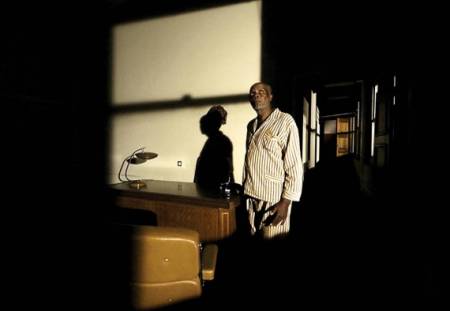 More of Costa's aestheticized dream world of memory, poverty, exile, and loss
More of Costa's aestheticized dream world of memory, poverty, exile, and lossI reviewed Costa's previous feature, the nearly three-hour 2006
Colossal Youth, as part of the 2007 San Francisco Film Festival -- my first experience of Costa and a "challenging" and "numbing" one, to use words from "
Justin Chang's review for
Variety. This time the
Variety review of Costa's new film, Horse Money is by
Scott Foundas and it is glowing. Foundas calls the film Costa's "most striking" view yet of the Lisbon Cape Verdean underclass in the slum neighborhood known as Fontainhas and his "muse," the aging former construction worker Ventura, that he has long depicted.
In between, there was the New Directors screening of Costa's handsome short musical feature about Jeanne Balibar,
Ne Change Rien, in intense contrasty black and white. This film was much easier to take. It also showed clearly that Costa is a filmmaker who likes his documentary elements heavily laced with visual beauty and aestheticism.
He has outdone himself this time, producing a livelier and more handsome work focussed on the Cape Verdeans of Lisbon than
Colossal Youth ( and with a more manageable run-time) -- not that this means
Horse Money has appeal to anyone but particular fans and well-primed festival audiences. But if you are patient, there is much to delight the eye and puzzle the mind. Working in color now, with patches of cool sunlight and occasional burnt siennas and bright reds and dark crimsons, and still using the Academy ratio, Costa shows off his keen eye and fine sense of composition within this almost-square space in every shot. The "action" is dreamlike, repetitious, more in the order of tableaux than scenes.
"Where does [Costa's] astonishing new
Horse Money 'take place?" asks Noel Murray in
The Dissolve. And he answers: "In the soul-space of Ventura, who has been at the center of Costa’s last few shorts and his 2006 feature
Colossal Youth. It is
now, a numbing and timeless present of hospital stays, bureaucratic questioning, and wandering through remembered spaces… and it is
then, the mid ’70s and the time of the Carnation Revolution, when Ventura got into a knife fight with his friend Joaquim. A self-reckoning, a moving memorialization of lives in danger of being forgotten, and a great and piercingly beautiful work of cinema."
Costa is expert at using abandoned or unpromising spaces. Initially there is a seeming series of caverns leading to an elevator in a hospital, and at the end there is a long dialogue staged in that elevator space between Ventura and a military man painted gray like a street performing "statue." When Costa shows interior dwellings, they too look like caves, dank, weathered, forbidding and powerful presences. Another sequence is in a small abandoned factory, always with that signature patchy sunlight and shadow, where Ventura's godson, saying he has waited 20 years for his paycheck, has imaginary conversations on out-of-commission telephones, and drags one with him from one room to another, staging a scene in the boss's office. Spaces invade memory and memory invades space. And always there is the striking use of patches of pale sunlight alternating with rich shadows. A group of younger men visit Ventura in bed in hospital and tell him their tales of poverty and exploitation. They may be real visitors, or ghosts. An old woman, Vitalina (Vitalina Varela), speaks about returning to Lisbon from Cape Verde for the funeral of her husband. But there is no plot, no action as such, and the repeated retailing of mumbled biographical details of work, marriage, and immigration is wearying.
Above and beyond his dwelling upon his special and specific impoverished, used-up people and place, Pedro Costa aestheticizes poverty, sadly, hopelessly, enigmatically, but with decided flair. The world he depicts or creates is claustrophobic and depressing. The etched, well-composed chiaroscuro in which it's filmed is an ironic, finally inadequate compensation. It was particularly thought-provoking to see this film right after watching the Dardennes'
Two Days, One Night. The Belgians give us hope. Costa wallows in nostalgia and despair. But he is an artist and an original.
Horse Money/Cavalo Dinheiro, 103 mins., DCP, in Portuguese and Creole, debuted at Locarno, where it won the Directing prize. Watched for this review as part of the 52nd New York Film Festival, its U.S. premiere (Wednesday, September 24, 2014).
__________________
(For my full coverage of the 2014 NYFF see also
FILMLEAF.)





